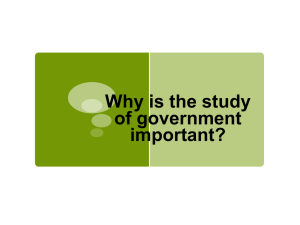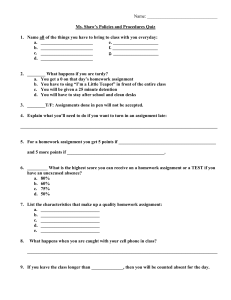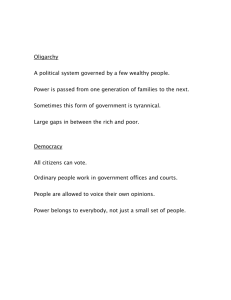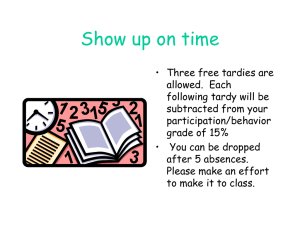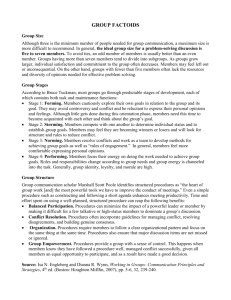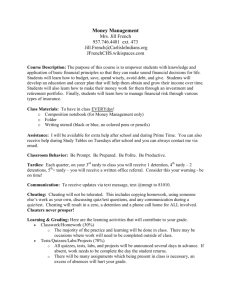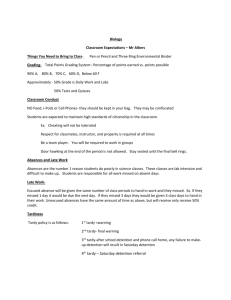CLASSROOM EXPECTATIONS * RESPECT YOURSELF * RESPECT OTHERS
advertisement
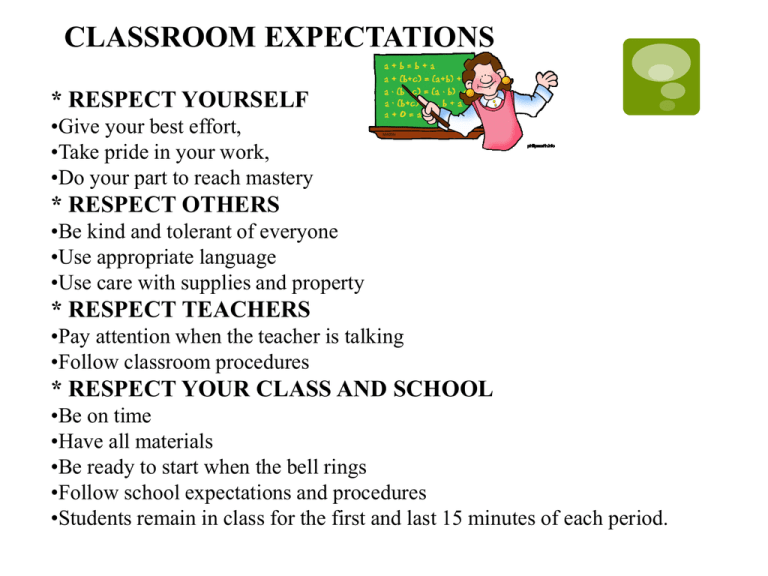
CLASSROOM EXPECTATIONS * RESPECT YOURSELF •Give your best effort, •Take pride in your work, •Do your part to reach mastery * RESPECT OTHERS •Be kind and tolerant of everyone •Use appropriate language •Use care with supplies and property * RESPECT TEACHERS •Pay attention when the teacher is talking •Follow classroom procedures * RESPECT YOUR CLASS AND SCHOOL •Be on time •Have all materials •Be ready to start when the bell rings •Follow school expectations and procedures •Students remain in class for the first and last 15 minutes of each period. TARDY PROTOCOL * FIRST TWO TARDIES - Teacher Keep students after class * THIRD TARDY - Teacher Keep student after class Call parents * FOUR OR MORE TARDIES – Teacher and Office Keep student after class Referral to Lunch Detention NOTES: •Refusal to stay after class will result in lunch detention until the time with the teacher is served. •Failure to serve lunch detention will result in a discipline referral for defiance, ISS and a parent meeting with the administrator. In an effort to deter students from being tardy to class, we are asking that students not be allowed to leave the classroom for the first and last 15 minutes of each period. Monday, November 16, 2015 Those with A’s and B’s on report cards 1st trimester will see a movie in the PAC on Monday during 5th and 6th periods. The PBIS Committee wants to reward students with perfect attendance running from November 12th to December 17th with ice cream and social time on December 18th from 2:453:05. Pre Assessment Why is the study of government important? What is government? The institution through which a society makes and enforces its public policies. If we did not have government, who would: Protect? Educate? Provide and regulate healthcare? Regulate the environment? Take care of streets and traffic? Punish criminals? Provide civil rights for the elderly and poor? Protect consumers and property owners? On your own……. List 10 daily activities Next to each item, list a law that may affect the activity Going to school – can’t drop out until 18 Would you change any of these laws? Why or why not? We all have opinions on everything….. What are your opinions on the following: Gun laws Federally funded health care Prayer in school Welfare Gay marriage Abortion Federally funded college education So, yes, we can all have opinions on issues. But what does this have to do with understanding how government works or functions? Write down and explain the meaning of one of these quotes: “Too often we enjoy the comfort of opinion without the discomfort of thought.” --John F. Kennedy “Everyone is entitled to their own opinion, but not to their own facts.” --Daniel Patrick Moynihan “Opinion is the exercise of the human will which helps us to make a decision without information.” --John Erskine What’s the difference between an informed and uninformed opinion? Which is easier to argue against? Has someone ever successfully changed your opinion about a subject? How? This is one of the more important classes you’ll take in high school! Why? "No one is born a good citizen; no nation is born a democracy. Rather, both are processes that continue to evolve over a lifetime. Young people must be included from birth. A society that cuts off from its youth severs its lifeline." --Kofi Annan Politics & Government does affect you! “A government big enough to give you everything you want, is strong enough to take everything you have.” —Thomas Jefferson “Just because you do not take an interest in politics doesn’t mean politics won’t take an interest in you.” —Pericles, 430 BC In this 21st century age of information…. We need to be able to effectively share our opinions. But we must be educated about the topics. The purpose of this class is to teach you HOW government works and WHY your involvement matters. If we fail to teach you this, here is the consequence: “The best argument against democracy is a five-minute conversation with the average voter.” Winston Churchill What does that mean? And yet: “ It has been said that democracy is the worst form of government except all the others that have been tried.” --Winston Churchill What does THIS mean? The purpose of this class: Teach you about the various forms of government in the world, with a particular focus on understanding our own. To help you understand what it means to be a “citizen” of a state & nation. To learn about the politics, or process, involved in government and how the making of POLICY affects us all. What is PUBLIC POLICY? THIS IS A TERM THAT WE WILL REFER TO OFTEN IN THIS CLASS. PUBLIC POLICY WHAT GOVERNMENT DOES OR DOES NOT DO TO ADDRESS AN ISSUE OR PROBLEM (think about the list of issues we just gave our opinions on) Policy might take the form of a law or regulation Policy is directed toward a goal or desired solution Policymaking is part of an ongoing process; it's often revisited or revised UNIT #1 ESSENTIAL QUESTION: How do people around the world form governments to Establish order Provide security & accomplish common goals? Learning Targets for Unit 1: LT1: I can define government and the basic powers every government holds. LT2: I can describe the four defining characteristics of the state. LT3: I can identify four theories that explain the origin of the state. LT4: I can understand the purpose of government in the United States and other countries. LT5: I can compare and contrast the forms and functions of government in key countries around the world (Russia, China, India, Brazil, Iran, EU country)
